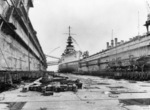Sembawang Bases
| Type | 24 Air Base, Army Base, Navy Base, Shipyard | |
| Historical Name of Location | Sembawang, Singapore, Singapore | |
| Coordinates | 1.425278000, 103.812778000 |
Contributor: C. Peter Chen
ww2dbaseIn 1923, the British Royal Navy announced the plans to establish a major navy base in Singapore. Construction began in the same year, but progress was slow as it had a low priority. In 1931, Japan invaded the Manchuria region of northeastern China, which alarmed Britain, and the construction of the Singapore naval base began to pick up pace. His Majesty's Naval Base Singapore was finally completed in 1939 at the cost of £60,000,000. It boasted the 300-meter long King George VI Graving Dock (the world's largest drydock) and Admiralty IX Floating Dry Dock (the world's third largest floating drydock), and stored enough fuel to support the entire Royal Navy for six months. Aside from it being a navy base, it also had airfields which served Royal Air Force and Fleet Air Arm aircraft; these facilities were officially named RAF Sembawang and Royal Naval Air Station Simbang, respectively. Collectively, these bases were defended by several 15-inch naval guns stationed by nearby Johore, Changi, and at Buona Vista; smaller guns were installed at Fort Siloso, Fort Canning, and Labrador.
ww2dbaseAfter a relatively brief battle, the Japanese took control of the bases in early 1942. British troops destroyed the gates to the King George VI Graving Dock, among other acts of sabotage around the base, but ultimately the Japanese Navy would make the repairs, and operated the base through the length of the war. In 1944 and 1945, Allied aircraft conducted air raids against the base; the drydock was among the primary targets.
ww2dbaseIn Sep 1945, the British regained control of the bases after the Japanese surrender. Sembawang continued to be an important military complex for the British after WW2, and it was a major staging area for operations during the Malayan Emergency of 1948 to 1960 and subsequent uprisings of the colonized peoples. In 1968, part of the naval base was converted into a civilian shipyard. In 1971, Britain gave up control of the facilities (leaving behind only a very small British contingent and a New Zealand Regiment, the latter of which remained until 1999), and the bases were turned over to the Singaporean military. In 1992, Singapore agreed to allow the Logistics Group Western Pacific of US Task Force 73 to establish its headquarters at Sembawang.
ww2dbaseSource: Wikipedia
Last Major Update: Jul 2013
Sembawang Bases Interactive Map
Photographs
 |  |  |  |
Please consider supporting us on Patreon. Even $1 per month will go a long way! Thank you. Please help us spread the word: Stay updated with WW2DB: |

Sembawang, Singapore, Singapore
Latitude-Longitude:
1.4253, 103.8128
- » 1,182 biographies
- » 337 events
- » 45,119 timeline entries
- » 1,248 ships
- » 350 aircraft models
- » 207 vehicle models
- » 376 weapon models
- » 123 historical documents
- » 261 facilities
- » 470 book reviews
- » 28,411 photos
- » 365 maps
Lt. Gen. Lewis B. "Chesty" Puller, at Guadalcanal
Please consider supporting us on Patreon. Even $1 a month will go a long way. Thank you!
Or, please support us by purchasing some WW2DB merchandise at TeeSpring, Thank you!